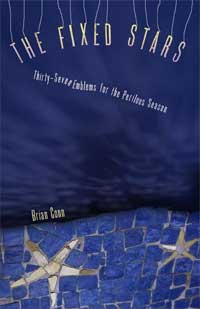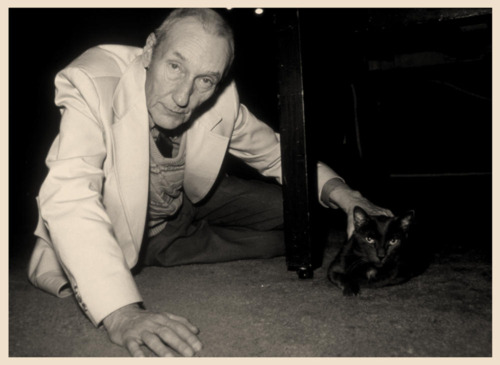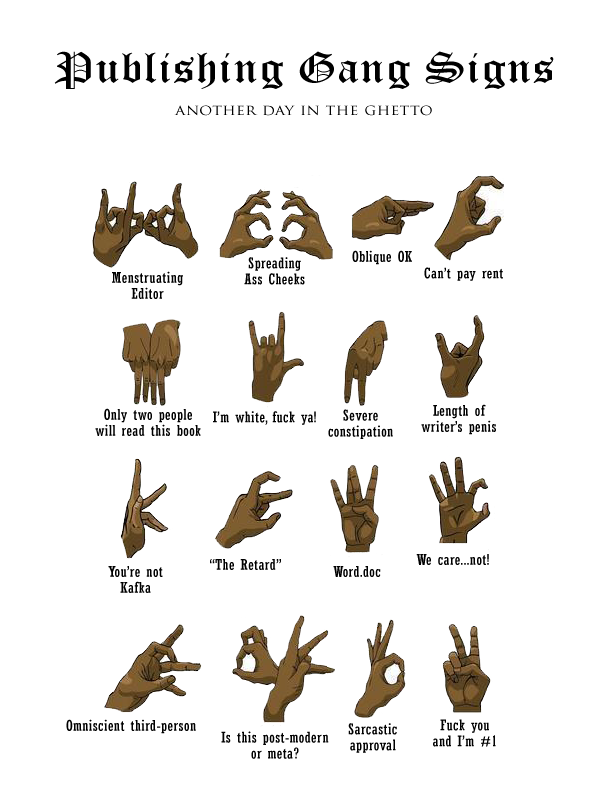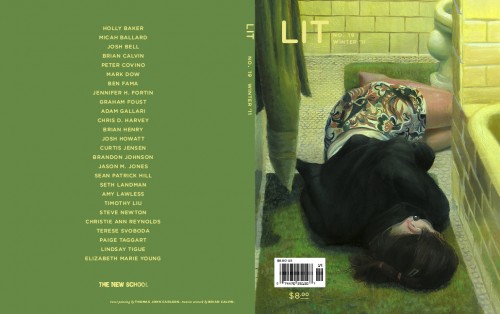Do These Right Things
The Emerson Review is looking for excellent writing for their next issue. Submissions are open until February 1 and they are interested in poetry, nonfiction and fiction. Send them something grand.
Issue 10.6 of DIAGRAM is live with writing from Nayelly SJ Barrios; Bridget Bell; Jody Brooks; Christopher Bundy; MRB Chelko; Paul Cunningham; Jim Fisher; Trey Jordan Harris; Christine Larusso; Robert Hill Long; Bo McGuire; Rebecca Mertz; David James Miller; Rufo Quintavalle; Samantha Stiers; and Quintan Ana Wikswo.
Ricky Gervais explains why he is an atheist.
I’ve been really interested in this post by Kevin Smith where he talks about success and work that doesn’t feel like work. I believe many successful people can relate to the sentiments Smith expresses in his post. When we consider successful people, we rarely pay any attention to how or why the success was achieved. We focus on the success itself because it is the success that is visible not the why of the success.
Spike Lee has released a book, Do The Right Thing, with behind-the-scenes photos, interviews, reflections from Lee and more.I’m looking forward to reading this book. I loved the film.
Jason Sanford offers a message to a writer who did not do his due diligence.
I admire writers with discipline. Laila Lalami took a year of silence, where she decided not to submit her work anywhere or agree to any requests for contributions. Instead, she simply focused on reading and writing.
Shane Jones engaged in an exchange with Poets & Writers wherein he discussed his writing process for one of the magazine’s features and then things got interesting.
I love this bag and want one quite badly.
Salvatore Pane shares his fiction workshop syllabus for next semester and suggests more teachers do the same.
It is the end of the year. Many people in many places are making end of the year lists summarizing where they went, what they did, what they read, loved, hated, and on and on and on and on. What’s on your list?
You are writing in a period more than twenty years after the death / of / Donald / Barthelme. Act like it.
Cook Food Everyday

Last year, a Boston DIY gal pal started spreading the word she was putting together a cookbook for charity. 100% of the proceeds go directly to the Greater Boston Food Bank, and the book’s been featured on the Cooking Channel. I’m in it but under the penname nicnasty with no bio just in case people hated my recipes. The other recipes and writing in the anthology are by some pretty awesome vegans, food critics, vagabonds and good-hearted cooks. My sometimes band Mind Yeti (I’m on the kazoo, wazaa) played the book release and we sold 150 copies the first night. Kristina is the editor and food expert so she can better explain all of it than I can below because I am not an expert at all.
Cook Food Everyday,
Nicolle Elizabeth
Follow up to my review of Adam Kotsko’s Awkwardness

After reviewing Awkwardness, I have gone back to explore Adam Kotsko’s group blog, “An und für sich,” and would like to recommend it to readers of htmlgiant. Particularly interesting is their comment policy. You thought we were assholes, take a look at this:
We also have little tolerance for people who whine that the conversation is mainly for insiders — we know it is; we chose for it to be that way on purpose. If you’re not an insider to the various discourses we participate in and you’re still interested in the topic, figure out a way to become more of an insider. If you want advice about that from one of the blog authors, try to ask in a way that shows you’ve done some work on your own.
The whole thing is worth a look, as is their “Open letter to lurkers.” Actually, I don’t think theirs is really a bad perspective, just one that sounds bad when said out loud. Other posts that I like are “Further Symptoms of Insanity,” in which Adam outlines why he might write another book that doesn’t impact his chance at tenure, and this uncomfortably hilarious video called “Conventional Wisdom Parody Technique.”
Adam Kotsko’s Awkwardness

Looks like an expert to me
Adam Kotsko, whom I interviewed in June 2009 about his book, Žižek and Theology, has just put out a long essay called Awkwardness. (He’s published two other books since that 2009 interview, too, damn. One is called The Politics of Redemption and the other is a translation of Agamben’s The Sacrament of Language. He makes my 2010 feel lazy.)
Awkwardness is about awkward situations as seen in popular TV and movies and your mama’s. He examines these situations in terms of Heideggerian relationality, similar to the way Kierkegaard looked at irony. Because of its pop-culture conceit it reminds me a bit of those “Simpsons and Philosophy“-type books that I used to buy because I liked the Simpsons or baseball but then would never read because, lo, they were still heady academic essays after all. But Awkwardness doesn’t market itself that way — as it shouldn’t. For one thing, Kotsko doesn’t limit his subject matter; The Office, some girl singing at a bar, and Larry David all come under scrutiny in the course of discussing awkwardness. Even the book’s introduction says it started as a joke, this isn’t philosophy-for-philosophy’s-sake. READ MORE >
December 27th, 2010 / 7:33 pm
Weird Lens of the Unconscious: An Interview with Brian Conn
 Brian Conn’s novel The Fixed Stars is a braid or a maze of fragments that together create an apocalypse, or an illusion thereof. It operates in turns as horror novel, as dystopia, as utopia, as Star Trek/Shakespeare pastiche, and also other modes, with language at once rock hard and dream-logicked. It was one of the most beautiful, challenging books published in 2010, and it didn’t get the attention it deserved. You should really and actually buy it. He is also the co-editor, with Joanna Ruocco, of Birkensnake, one of the more adventurous and interesting-to-touch journals available online and in print.
Brian Conn’s novel The Fixed Stars is a braid or a maze of fragments that together create an apocalypse, or an illusion thereof. It operates in turns as horror novel, as dystopia, as utopia, as Star Trek/Shakespeare pastiche, and also other modes, with language at once rock hard and dream-logicked. It was one of the most beautiful, challenging books published in 2010, and it didn’t get the attention it deserved. You should really and actually buy it. He is also the co-editor, with Joanna Ruocco, of Birkensnake, one of the more adventurous and interesting-to-touch journals available online and in print.
Brian was kind enough to talk with me at length about the ways we sort fiction, how he perceives character and voice, and other things.
* * *
MM: You wrote, in a blog comment I can no longer find, that you feel many of the major stories now seen as “literary” or “mainstream” and often offered as examples in creative writing classes, were actually very experimental works that created their own genre, and that these have only been elevated to/claimed as official literary works after the fact. I think you were responding to a post about The Things They Carried at the time, which I see as a good example. Another one that I might suggest would be Kafka’s The Metamorphosis, which hasn’t been as tamed and integrated as The Things They Carried, but is often offered as a model or set of rules of how certain stories ought to be written. His story “In the Penal Colony” also spawned a sort of mini-genre, I think, but it’s a weirder story and so it hasn’t really gotten the same treatment. Have I butchered your argument or would you like to further refine it? Do other examples come to mind?
BC: I do remember saying that at some point, and also forget where. The examples you mention are good ones, but it actually seems to me that literally every great (whatever that means) story is radically experimental in its own way. Last week I reread “The Dead,” which I usually think of as pretty straight, but even that gets bizarre once you start looking at it — for example the way various characters’ voices are continuously fading subtly in and out, so that even though there appears to be an omniscient narrator it’s hard to find a single line that’s purely in that narrator’s voice, and instead the whole narrative is sort of floating on this shifting sea of character voices.
I mean, what is a canonical “normal” story today? Hemingway? “A Good Man is Hard to Find”? But those are totally weird, right? “The Lottery”?




